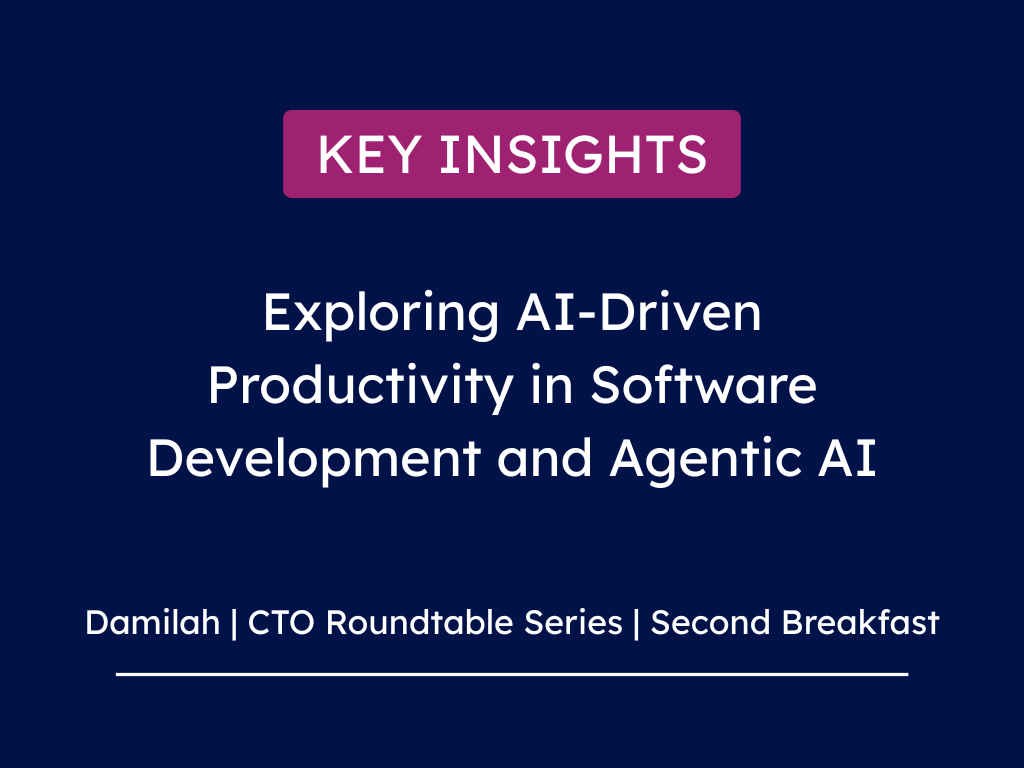What Will AI-Enabled Teams Really Look Like?
Shifting Roles, Smarter Tools, and the Future of Software Delivery
14th October 2025, 8.30-10.30 am, etc. venues Monument- Dividend Space,
8 Eastcheap, London EC3M 1AE
EVENT OVERVIEW
We’re pleased to invite you to the fourth edition of our CTO Breakfast Roundtable series—a peer-led conversation built for senior engineering and technology leaders.
The pace of change in software engineering is accelerating. AI and automation are no longer side tools—they’re becoming core to how software is designed, built, and maintained.
But what happens when AI moves from assisting developers to shaping the entire SDLC, influencing team structures, and redefining the skills that matter most?
In this roundtable, we’ll look ahead to the not so distant future of fully AI-enabled engineering teams—where AI becomes a core collaborator—not just a co-pilot, and where leadership means designing the workflows, roles, and governance that can thrive in a new era of software delivery.
Together, we’ll map out the workflows, roles, and capabilities that will define the next generation of engineering teams—and explore how to get there without losing quality, culture, or trust.
Reserve your seat and be part of the conversation shaping how we work tomorrow.
KEY DETAILS
- Date: Tuesday 14 October 2025
- Time: 8:30–10:30 AM
- Location: etc.venues Monument- Dividend Space
- Address: 8 Eastcheap, London EC3M 1AE
KEY DISCUSSION POINTS
- How AI and automation are reshaping the SDLC
- What is already changing in daily developer life and where humans still add the most value
- Real-world use cases of AI in code generation, testing, reviewing, and operations
- Emerging team structures and new roles to fit fully AI-enabled engineering teams
- The rise of product engineers, prompt engineers, and model operations specialists
- Rethinking the role of the developer when AI handles 80% of the boilerplate
- Skills that matter most in modern engineering organisations
- The growing need for systems thinking, product mindset, and cross-functional fluency
- How to attract, retain, and grow engineering talent in a shifting landscape
- Integrating AI without breaking your SDLC
- Governance, trust, and keeping processes intact
- How teams are designing workflows to accommodate AI while staying compliant
- From co-pilots to collaborators: navigating the transition to AI-augmented engineering
- What early adoption is teaching us about productivity, trust, and team dynamics
- Charting the path from assisted coding to true human–AI collaboration
WHY ATTEND
- Look ahead: Explore what fully AI-enabled engineering teams could look like—and what it will take to lead them.
- Learn from peers: Hear real-world experiences of AI adoption including new team structures and roles.
- Lead the change: Share your perspective and help define the skills, governance, and processes that will matter most in the years ahead.
- Build Connections: Network with CTOs, Heads of Engineering, and product leaders who are driving change in growth-stage and established software organisations.
This session is limited to a small group of senior engineering leaders. If you’re building or scaling AI-enabled teams, secure your seat today.
Damilah | CTO Breakfast Series
What Will AI-Enabled Teams Really Look Like?
Shifting Roles, Smarter Tools, and the Future of Software Delivery
14th October 2025, 8.30-10.30 am, etc. venues Monument – Dividend Space,
8 Eastcheap, London EC3M 1AE
Explore more: Find related articles on our Blog
-

Damilah | CTO Roundtable Series | Third Breakfast
Exploring the Shape of AI-Enabled Software Teams of the Future: Roles, Responsibilities, AI Tools and Agents across the SDLC KEY TAKEAWAYS How AI Is Changing the Shape of Engineering Teams For our third CTO Breakfast Roundtable, we brought together CTOs, Heads of Engineering, Product leaders, and investment partners for a direct, practical discussion: What will our…
-

Damilah | CTO Roundtable Series | Second Breakfast
Exploring AI-Driven Productivity in Software Development and Agentic AI KEY TAKEAWAYS AI, Productivity & Agentic Systems: Where Engineering Leaders Are Headed Next As AI continues to transform software development, engineering leaders are rethinking how teams work, how tools are used, and how success is measured. At our latest CTO Breakfast Briefing, technology executives gathered to…

